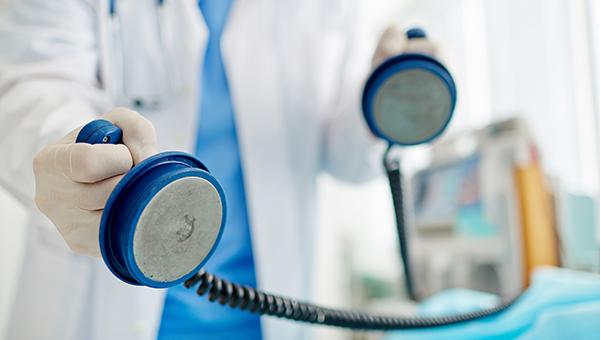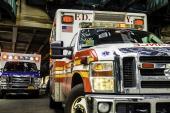COVID-19 Patients Less Likely to Survive Cardiac Arrest In-Hospital
Even so, a researcher says, “COVID-19 infection alone should not be used as a factor in withholding CPR from these patients.”

Compared with hospitalized patients who were not infected with SARS-CoV-2, those with COVID-19 had lower rates of survival to discharge and of a return of spontaneous circulation for 20 minutes or more, according to researchers led by Saket Girotra, MD (University of Iowa Carver College of Medicine, Iowa City). They were also more likely to have delayed defibrillation, although the worse outcomes in patients with COVID-19 persisted even among the group that received timely treatment.
Of note, however, survival among patients with COVID-19 in this study—though still poor (11.9%)—was better than some had feared based on initial small studies out of the US and China, which provided rates of zero to 3%. That sparked some talk of implementing universal do-not-resuscitate orders for patients infected with the virus, both to avoid a futile effort and to limit healthcare workers’ exposure to COVID-19.
Girotra told TCTMD he isn’t aware of any centers that actually implemented such a policy, and said “our findings suggest that COVID-19 infection alone should not be used as a factor in withholding CPR from these patients. These data should be used for guiding discussions among physicians and their patients and their families regarding their preferences, giving them the probabilities of survival based on the experience of similar US hospitals across the country.”
For the study, published this week in a JAMA Network Open research letter, the investigators examined data from the American Heart Association Get With the Guidelines-Resuscitation registry. The analysis included 24,915 adults (mean age 64.7 years; 39.5% women) who had an in-hospital cardiac arrest in one of 286 participating hospitals between March and December 2020.
Roughly one-quarter (23.7%) had suspected or confirmed COVID-19, a larger-than-expected proportion that “highlights the enormous burden of the COVID pandemic on in-hospital resuscitation care,” Girotra said. Although these patients were younger than those who didn’t have COVID-19, they were sicker, being more likely to have respiratory failure and to be on a ventilator and to have an initial unshockable rhythm.
COVID-19 infection alone should not be used as a factor in withholding CPR from these patients. Saket Girotra
Even after accounting for those differences, patients with COVID-19 had lower rates of survival to discharge (11.9% vs 23.5%; adjusted RR 0.65; 95% CI 0.60-0.71) and of a return of spontaneous circulation for 20 minutes or more (53.7% vs 63.6%; adjusted RR 0.86; 95% CI 0.83-0.90). Defibrillation of a shockable rhythm was delayed more frequently in patients infected with the virus (36.6% vs 27.7%; RR 1.30; 95% CI 1.09-1.55), but there was no difference between the groups in the timeliness of epinephrine administration.
The poorer survival, however, was consistent across different subgroups, including patients with nonsurgical diagnoses, those in the ICU, and those who did not have delays in defibrillation or epinephrine. “The lower survival is most likely due to the fact that these patients were a lot sicker when they experienced a cardiac arrest compared to patients who were not infected with COVID-19,” Girotra said.
He said it’s unclear what impact wider availability of vaccines—which reduce the severity of infection, cut hospitalizations, and presumably lower the risk of in-hospital cardiac arrest—would have on these findings, adding that it’s something he’s interested in exploring in future studies.
The larger trend over time in survival after in-hospital cardiac arrest should be monitored, too, he indicated.
“Over the past two decades, we have experienced a significant improvement in in-hospital cardiac arrest survival. The COVID-19 pandemic has significantly undermined those gains,” Girotra noted. “It would be important to see whether we can return to the prepandemic levels of in-hospital cardiac arrest survival once the pandemic recedes.”
Todd Neale is the Associate News Editor for TCTMD and a Senior Medical Journalist. He got his start in journalism at …
Read Full BioSources
Girotra S, Chan ML, Starks MA, et al. Association of COVID-19 infection with survival after in-hospital cardiac arrest among US adults. JAMA Netw Open. 2022;5(3):e220752.
Disclosures
- Girotra reports receiving grants from the National Heart, Lung, and Blood Institute and an honorarium from the American Heart Association for editorial work, both unrelated to the current study.





Comments